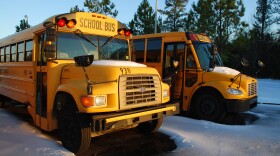Camp Kanata, a YMCA overnight camp, would normally be empty during the week this time of the year. Instead, the camp outside the town of Wake Forest has been transformed.
Ryan Eves, the camp's executive director, is showing me around.
"So down here is the cabin that we have repurposed into classrooms," he said. "Typically this is where our staff trainees sleep during the summer."
Camp Kanata is one of more than forty sites thatÔÇÖs been converted into an academic learning center, serving students in the Wake County Public School district.
"We were actually able to get desks and chairs from the school system to furnish our classrooms in here," Eves said. "YouÔÇÖll see some kids sitting outside under the overhang here."

The goal is to give students in kindergarten through eighth grade a safe place to work, with wifi, and an adult who can help them throughout the school day.
ItÔÇÖs especially helpful for working parents, like Kim Bishop.
"It was complicated and we had no control," Bishop said. "It felt like we had no control day to day."
Earlier this year, when schools closed due to the pandemic, Bishop and her husband suddenly had all three of their kids at home all day, every day. Their oldest son could do his work on his own, but they also had a kindergartner and fourth grader.
Bishop says she and her husband Zack would plan out who would help their two youngest based on when they had Zoom meetings for work they couldnÔÇÖt miss.
"And we just basically decided at the beginning of the day whose appointments and calls were the most important and worked around that," Bishop said.
She says her family had it better than most. They had jobs, could work from home. Everyone had the devices they needed, Wi-Fi, even their own rooms for the most part.
Still, the idea of another semester like the last nearly brings Bishop to tears. Now, the two youngest go to the learning center at the YMCA camp.

"Normal day, we get up; we get ready for school camp -- we call it 'scamp,ÔÇÖÔÇŁ she says.
At "scamp," moderators like Thomas Wilson help students troubleshoot, and make sure theyÔÇÖre on time for Google video and Zoom calls.
"ItÔÇÖs really interesting to see how some kids are catching on, and for them online class seems as normal as regular class could have," Wilson said. "And then I think there are some other kids who definitely need help staying focused, but thatÔÇÖs kind of what weÔÇÖre here for, you know."
Wilson is a student himself, at Brown University. His classes are also remote. That means he can save on rent, and still keep his summer job.
Learning Center sites are spread across Wake County, from Wake Forest in the north to East Raleigh to Garner to Apex. Partners like the Triangle YMCA, the Marbles Kids Museum and the Boys and Girls Club together are serving about two thousand students.
The Wake Ed Partnership is one of the groups that organized the effort. Keith Poston, the director, points out that the program is hampered by a lack of transportation. That means parents have to drop kids off, and that severely limits families without the financial means to do that.
"What weÔÇÖd like to do is be able to expand the sites and make it easier for families to get to them," Poston said.
Poston says about 30% of the students receive financial aid, and the cost for all is subsidized.
The program has been designed to grow to as many as ten thousand students. And it may still play a crucial role, even if the Wake County School Board votes next week to bring some students back to class, starting in October.
Those plans include rotating students in and out of the classroom - which means many will still need options like this. Especially if another wave of COVID-19 hits when the weather turns colder.











